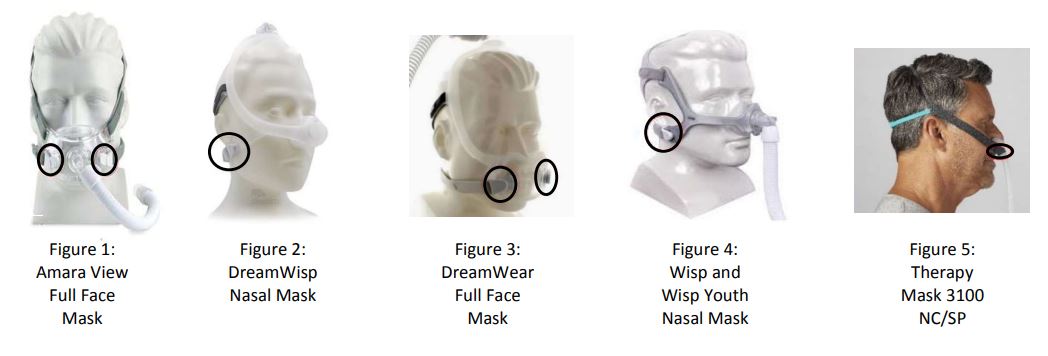Philips recalls 17 million sleep apnea masks over magnets that could affect implanted devices
Certain Philips Respironics Masks for BiPAP, CPAP Machines Recalled Due to Safety Issue with Magnets That May Affect Certain Medical Devices
Comprehensive Sleep Care Center is alerting patients, caregivers and health care providers that a recall was issued on 17 million CPAP and BiPAP sleep apnea masks manufactured by Philips Respironics (Philips) that contain magnetic clips. The recalled masks have magnetic clips that are used to attach the headgear straps to the mask. However, new warnings say that the masks should not be used if the patient or household members, caregivers or bed partners have a metallic medical implant.
The use of the affected masks is now “contraindicated for patients and their household members, caregivers and bed partners that may be in close vicinity to patients using the masks” who have implanted devices such as pacemakers.
The magnetic clips have reportedly interfered with medical metallic implants or objects in the body such as pacemakers, cardioverter defibrillators, neurostimulators, brain stents, aneurysm clips, ventriculoperitoneal shunts, ocular implants, magnetic denture attachments, insulin pumps, certain neurostimulators used in and around the neck, and cochlear implants in both the wearer of the mask and the people near them. The magnets may also affect patients with metallic objects in their bodies, such as shrapnel and splinters in their eyes, according to the FDA.
Philips has received 14 reports of patients who said the mask’s magnets may have affected their medical devices, causing problems such as pacemaker failure, defibrillator shutoff, change in heartbeats and cognitive issues. No deaths have been linked to the recall, but the announcement said that fatal outcomes are possible.
The recalled masks include:
- Amara View Full Face Mask
- DreamWisp Nasal Mask
- DreamWear Full Face Mask
- Wisp and Wisp Youth Nasal Mask
- Therapy Mask 3100 NC/SP
Recalled Sleep Apnea Masks

To see the official letter from Philips about the mask recall as well as a detailed list of masks please click the links below.
This recall is not associated with the polyester-based polyurethane (PE-PUR) foam issue for certain ventilators, BiPAP machines and CPAP machines recalled in June 2021. However, this recall affects masks used with some of the devices that were recalled in June 2021.
Advice to consumers
The recalled masks may continue to be used when patients or those near them do not have metallic implants, Philips said in its updated instructions and product labels.
The recall is not intended to replace all masks with magnets that are in use. Instead, it is intended to alert consumers that the previous warnings on the devices have been strengthened, noting that the magnets may interfere with metallic implants.
“These masks are safe and may continue to be used according to the updated instructions and labeling if patients or people in close proximity to them do not have implanted metallic medical devices or metallic objects in the body,” said Philips.
Meanwhile, other medical implants or medical devices that may be affected by magnets should remain at least 6 inches away from the recalled sleep apnea masks.
What do I do if I might be affected?
Those who have a device listed below or live with someone who has a medical implant listed below, they should consult their physician who implanted their device.
Switch to a nonmagnetic mask. If you received your mask from Comprehensive Sleep Care Center and have a device listed on the contraindications list –
- Email us at [email protected] or

and we will schedule you to come in for a new mask refit.
Anyone with questions may contact Philips Respironics customer service at 800-345-6443 from Monday through Friday, 8:30 a.m. ET to 8 p.m. ET.
Other adverse experiences related to the recalled masks should be reported to the FDA’s MedWatch Program by phone at 800-FDA-1088, by fax at 800-FDA-0178, on the MedWatch Web site at fda.gov/medwatch, or by mail at MedWatch, HF-2, FDA, 5600 Fishers Lane, Rockville, MD, 20852.
These metallic devices and implants may be affected by magnets in the recalled masks:
- Pacemakers
- Implantable cardioverter defibrillators (ICD)
- Neurostimulators
- Magnetic metallic implants/electrodes/valves placed in upper limbs, torso or higher (such as neck and head)
- Cerebral spinal fluid (CSF) shunts (ventriculoperitoneal (VP) shunt)
- Aneurysm clips
- Embolic coils
- Intracranial aneurysm intravascular flow disruption devices
- Metallic cranial plates, screws, burr hole covers and bone substitute devices
- Metallic splinters in the eye
- Ocular implants (glaucoma implants, retinal implants)
- Certain contact lenses with metal
- Implants to restore hearing or balance that have an implanted magnet (such as cochlear implants, implanted bone conduction hearing devices and auditory brain stem implants)
- Magnetic denture attachments
- Metallic gastrointestinal clips
- Metallic stents (aneurysm, coronary, tracheobronchial, biliary)
- Implantable ports and pumps (insulin pumps)
- Hypoglossal nerve stimulators
- Devices labeled as MR (Magnetic Resonance) unsafe
- Magnetic metallic implants not labeled for MR or not evaluated for safety in a magnetic field
